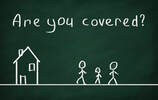 Have you ever thought about how much insurance a person should buy? If you ask the insurance agent, you might be told you should buy as much as you can afford. If you ask the underwriter, he might tell you that you should buy as much as he will approve. If you ask the customer, she might tell you that she wants only as much as she really needs (or the law requires, or she can get away with). If you ask an insurance advertiser… wait. Don’t do that. They don’t know anything but what they’re told, and they give unreliable information anyway. Forget them. Don’t ask them anything. Ever. They came up with cavemen and an emu. When buying property insurance, it’s complicated, but straightforward, to come up with a value of the property and buy insurance to cover that risk. When buying coverage for damage to their own vehicles, that’s also pretty simple. There aren’t a lot of options, unless there’s something unique about the vehicle. What about liability exposures? How much insurance is enough? How much is too much? Can a real case be made for minimum liability limits? Is there such a thing as too much insurance? Insurance needs change over time. What worked when we were young won’t work when we are in the middle of our working lives, and none of that will work when we reach retirement. A younger person who is in college has clearly different insurance needs than a family of four does. The hobby farmer has different needs than the commercial farmer. Over our lives, our insurance needs continue to change. We buy newer cars, our income changes, our career changes, we add to our families, and our family dynamics change. Insurance is meant to protect our assets. If you ask 100 people why they buy insurance, you’ll get answers like, “I have to have auto insurance, or they’ll take away my license,” or “my bank made me buy insurance to get a mortgage,” or “my Mom and Dad told me to buy this policy from our family agent”. Those are all terrible reasons to buy insurance. The number one reason that we buy insurance is that we don’t have the cash on hand to replace the asset covered by the policy. Don’t buy homeowners’ insurance because the bank or your real estate agent tell you to. Buy it because you don’t have the money to replace your house or the things in your house if a Hurricane takes it all into the ocean, or a tornado takes everything into the next county. If you have a clunker car, do not think you definitely don’t need physical damage coverage for that vehicle. Don’t think that you definitely do need it, either. Give your insurance agent the following information:
So how do we pick liability limits? That’s a harder question than anything so far. A house has a tangible value. You can count the amount of wood, blocks, bricks, panes of glass, and other items that go into rebuilding a house. A car has a value that you can calculate. The laptops, televisions, cell phones, and record players in the house all have a specific cost to them. Liability limits are a bit harder to pin down because we don’t always think about what we’re protecting with it. Liability insurance helps to protect the items that make up the net worth of an individual, a family, or an organization. Liability insurance protects us when we are somehow involved in someone else’s loss or damage. We own the home where they tripped over the skateboard and fell down the stairs. We invited them over to dinner and served those steaks that smelled a little off. We drove the car that created the accident. The question that most wants answered is how little can I buy and get away with it? The only answer to that is how much risk do you want to take? It is important to keep in mind that once the liability limits are exhausted, or when there is no coverage, the customer can become personally responsible for those damages. So, the question isn’t usually how little do I need, but what will properly protect me if something happens? In answering that question, it is important to share information with your Insurance Agent. What is your situation? Do you have retirement savings that could be forfeited in the event of a catastrophic liability claim? Do you earn wages that can be garnisheed? Do you have property that can have a judgment lien placed on it? The other side of the coin is worth exploring, too. There are some who don’t make a lot of money. They own next to nothing. They don’t have any savings, property, or other assets. They might be a in position where a judgment means little. A judgment could be entered, but what are they going to get? Finding the right limit including looking at the assets at risk today, then projecting those assets into the future 3-5 years. Look at the current income and project that into the future 3-5 years. Evaluate your life and project that 3-5 years. That should give everyone a good idea of how much coverage you need. Some just want the emu policy and to be left alone. Others simply need insurance. They need it simple. They need it inexpensive. In the end, it’s all about meeting your individual needs and understanding that you might not always know what you need. So, if you know that you need insurance, but aren't sure exactly what kind or how much you need, give us a call one of our licensed and highly trained insurance agents today at 919-550-8530. Family Insurance has been helping individuals, families and companies for over 14 years and is located at 50-12 Neuse River Parkway Clayton, NC 27527.
0 Comments
Leave a Reply. |
"Happiness is not by chance, Topics
All
|